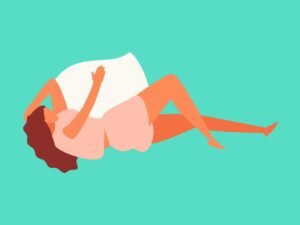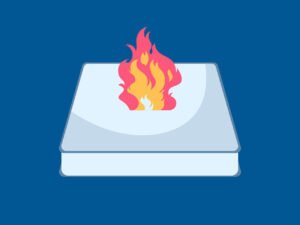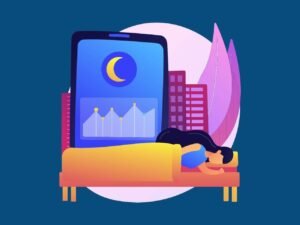We all want our sleep to be as effective as possible, especially when we don’t have enough time to sleep because then we want the time that we do have to sleep to be used optimally.
It appears that going to sleep at certain hours achieves exactly that.
The Best Sleeping Time is From 10pm to 4am which means that going to sleep at 10 pm can help you to get the most of your sleep.
But what if it’s 10 p.m. and you are not able to go to bed yet?
Maybe it’s hard for you to fall asleep so early, or you work on nightshifts, and maybe you just want to party all night.
If so, keep on reading and see what solutions science has to offer you…
Contents
Why the best sleeping time is from 10pm to 4am?
There are 2 important factors that affect your sleep:
- Your malatoning production. Higher melatonin production = better sleep quality.
- Your core body temperature. When you go to sleep your body temperature should decrease slightly to help you fall asleep.
Your body produces the highest amount of melatonin (the sleep hormone) and your core body temperature is decreasing, starting from 3 hours after sunset until around 6 a.m.

It means that the best time to go to sleep depends on your geographical location and the current season of the year.
But in most cases, it would be around 10 p.m.
I Want to Go to Bed at 10 pm but Can’t Fall Asleep
View this post on Instagram
Follow for more quick sleep tips
If you are not able to fall asleep so early or just hate it, don’t give up on it yet.
There are a few tricks you can do when you wake up, during the day, and/or before sleep that will help you to fall asleep at the hours where your sleep is most effective.
Since a person who sleeps from 10 p.m. to 6 a.m. usually has a better sleep quality than a person who sleeps from 2 a.m. – 10 a.m. even though both of them sleep for 8 hours, I highly recommend that you use at least some of the following tricks.
Morning Actions for a Good Night Sleep
Expose yourself to sunlight when you wake up. It signals your body that it should be awake on this hour, and increases your serotonin production.
Serotonin (also called ‘the happy chemical’), improves your mood, wellbeing, and enables nervous system cells to communicate.
It’s no surprise that a research found that sunshine might protect against suicide.[1]
Since the precursor to melatonin is serotonin, producing serotonin in the early morning, will help your body to produce more melatonin in the late evening.
Another important hormone for regulating the circadian rhythm is cortisol (the stress hormone).
Usually, this hormone should be at its peak of production around 9 a.m.
Therefore, in order to help to regulate your circadian rhythm, do actions that encourage cortisol production, such as a workout around 9 a.m., a cold shower (start from showering the lower part of your body, not from your head), or drink a coffee.
However, if you already feel highly alert at 9 a.m., drinking coffee at that hour probably would not have any advantage.
During the Day Actions for a Good Night Sleep
Avoid drinking coffee after 12 noon. The half-life of caffeine is about 5 hours,[2] which means that if you drink coffee at 12 noon, 25% of the caffeine will still exist in your system at 10 p.m.
A study found that drinking coffee 6 hours before sleep decrease the sleep quality,[3] so if you feel you need an energy boost during the day you can:
- Try a 15 minutes power nap if possible.
- Take a cold shower if you dare.
- Have a break from the task that exhausting you and go do something fun until you feel your energy levels going back to normal.
Also, you can eat some foods during the day that will help you fall asleep at night, such as brazil nuts, bananas, and omega 3 supplements.
Evening Actions for a Good Night Sleep
Avoid eating a big meal 2 – 3 hours before bedtime as it might cause acidic reflux.
If you feel you have to eat something before bed, there are foods that will actually help you to sleep better, such as eating 2 kiwis an hour before bedtime.
Have a hot bath at 8:00pm – 8:30pm.
It will relax you and will make your core body temperature drop around 10:00 pm, which will help you to fall asleep faster.
Avoid screens (smartphones, TVs, tablets, etc) from 9 p.m. The blue light that comes from the screens decreases your melatonin production by 80%.[4]

If you have to watch screens before bedtime, use blue-light blocking sunglasses and blue-light reducing apps, such as Twilight and f.lux.
You also want to make sure that your bedroom is optimized for sleeping, which is what I’m going to cover on the next post.
Until my next post, here’s a quick tip: cool your bedroom to 18 degrees Celsius (65 Fahrenheit).
The blue light that comes from the screens decreases your melatonin production by 80% Share on XThings to do when you cant fall asleep
Now that it’s 10 p.m., your body produces melatonin, which is not only important for a good quality sleep, but also an effective anti-skin aging compound, which helps you to look young.[5]
But what if you are lying in bed and can’t fall asleep so early?
Falling asleep at 10 p.m. will become much easier when it becomes a routine, but even then, from time to time you might still need some help to fall asleep fast.
Fall Asleep Within 2 Minutes
A very useful technique used by the US navy can help you to fall asleep in 2 minutes. Here’s a video that shows you how to do it:
Some notes about the technique above:
- Repeating “don’t think” over and over again, might make you think about … not thinking. Don’t worry about it. It’s still doing the job of helping you to fall asleep.
- You need to practice this method each night for weeks in order to be able to fall asleep in 2 minutes.
Still Awake? Relax 🙂
If you are still awake, I would not recommend you stay in bed for more than an additional 20 minutes, since your mind might associate bed with being awake.
Get out of your bedroom and do something relaxing like reading a book until you feel tired.
When you read a book at night, make sure you use a low-temperature source of light, such as candles or a Himalayan salt lamp in order to avoid reducing your melatonin production.
Feeling tired already? Go to bed now and close your eyes. Don’t try to force sleep.
In case you are still awake after 30 minutes, go back to your relaxing activity until you are feeling tired again.
If you feel that the reason you can’t fall asleep might be that you are feeling pressure in your life and you need to relax, I recommend that you give a try to the stress management plan.
I Can’t Go to Bed at 10 pm Because I have a Night Shift
The Consequences of Working on Night Shifts
Night-shift workers are awake at the hours where our melatonin productions are at its peak, which means that they don’t use its vital effects.
A research found that shift workers have a 12.5% less general health score and 16.8% less psychological health score.[6]
In addition, night shift workers have difficulties falling asleep due to circadian cycle disruptions and their sleeping hours are reduced by 2-3 hours a night compared to their sleeping hours when they work in the daytime.[7]
Therefore, it’s not a surprise that 88% of night shift employees reported on back pains.
In addition, they reported on minor infections (86%), abdominal pain (72%), indigestion (70%), joint pain (60%), diarrhea (58%), loss of appetite (56%), and heart palpitation (22%),[6]
Solutions for Night Shifters
Now that we have finished with the intimidating data, here are solutions to reduce the damages of night shifts:
1. Work at Consistent Hours
Researchers found that individuals who worked 7 consecutive night shifts had a significantly better cognitive performance and sleep quality than those who worked 4 consecutive night shifts.[8]
How does it apply to you? Instead of moving your shift time every few days, try to make it as consistent as possible.
For example, work 1-3 months only on night shifts, and the rest of the year work on day shifts, so there aren’t many circadian cycle disruptions.
If you have to do a rotation in your work shift, forwards should be favored over backwards rotation.
Instead of moving your shift time every few days, try to make it as consistent as possible. Share on X2. Upgrade Your Lifestyle
Another opportunity to counter some of the consequences of working on night shifts is to change your lifestyle.
Here are some comparisons made by researchers between the lifestyle habits of day workers versus shift workers:[6]
- 62% of day workers exercise regularly but only 40% of shift workers do that.
- 64% of day workers consume homemade food while the majority of shift workers consumed food from canteen.
- About of 52% shift employees snacks daily and in day employees this figure is 38%.
Therefore, you should:
- Exercise regularly.
- Cook your own healthy food. If you don’t know how to cook tasty healthy food, I recommend ‘The How Not to Die Cookbook‘.
- Snack less.
BTW, if you don’t have time to cook healthy food every day or two, there are some types of food you can cook for the whole week and freeze.
For example, a pizza from a quinoa crust:
3. Increase Your Alertness
Here are some more tricks to reduce the night shift’s consequences and risks:[9]
- Breaks may lower the risk of accidents, especially on long shifts.
- Bright light and melatonin may hasten adaptation to long-term night work but are not recommended for shorter periods of night work.
- A short nap in the beginning of the night shift is recommended for improving alertness.
- Caffeine in the beginning of the night shift may help sustain performance.
You Can’t Repay a Sleep Debt
I hope that you gone through all the solutions above and I also hope you noticed that sleeping a lot on weekends is not there.
It’s not there for a reason…
We don’t have a sleep bank in our bodies that makes it possible to have a sleep debt, and then to repay it on weekends.
If it makes you feel good to sleep a lot on weekends, then do it. Just don’t think that it’s the solution to night shifts and/or not sleeping enough.
Even though there are ways to reduce the damages of night shifts, people with illnesses that make them vulnerable to the negative effects of night work should not be recruited to such work.
I Don’t Want to Go to Bed Early – I Want to Party
If you party on weekends but need to wake up early on weekdays, that’s a problematic situation because it’s like having a jet leg every week.
All the consequences and risks mentioned about the night-shift works are also applied to this situation, only that night shift workers are able to go to sleep on a consistent hour the whole week, which reduces the damages.
Solution for the Freelancers
If you don’t have to wake up in the morning on a specific hour (for example, a freelancer who works from home), then you have 3 options:
- If you are one of those rare cases that able to wake up late and still fall asleep at 10 p.m., then do that. During the day, try to exhaust yourself physically (train hard) and mentally (make a lot of decisions, use your willpower) in order to feel exhausted at night.
- Every day go to sleep 30 – 45 minutes earlier than the day before until you are able to go to sleep 3 hours after sunset.
- Wake up at the same hour during weekdays even after partying on weekends. As we saw in the shift workers chapter, going to sleep for consistent hours reduces some of the damage of not going to sleep early. It’s still fine to try to wake up 15 – 30 minutes earlier every day in this situation.
Solution for the Salaried Employees
On the other hand, if you have to wake up early after the weekend, it’s the worst scenario because now you need to drive to work and do your job while you are sleep deprived.
Each one of us will be sleep deprived sometimes, hopefully only on rare cases, so we need to make sure that we do what we can to minimize sleep deprivation damages.
Here are some tips to help you survive your day while sleep deprived:
- Drink coffee before working. Avoid caffeine during the rest of the week so it will still have an impact on you when you really need it.
- Take a break/power nap during work if possible.
- Eat a breakfast rich in dietary fibers and complex carbs, such as quinoa and buckwheat.
- Whenever you are tired, listen to music that gets you pumped. It increases the production of the ‘feeling good hormone’, dopamine. If possible, dance while doing it.
- Make sure you drink enough water. You feel fatigued when you are dehydrated.[10]
- Make sure that the quality of sleep that you do get is as high as possible, by implementing the techniques on this blog.
- Expose yourself to bright light.
Final Words…
I know that it sounds like going to sleep at 10 pm is too hard and not worth all its benefits. But trust me, you want to give it a try because you deserve to have the best quality of sleep.
To get the most out of your sleep, you need to go to bed when it’s the best time to sleep, which is when your melatonin production is at its peak.
By doing so, you have more focus and energy during the day, better athletic performance and faster recovery, and better health in general.
It’s like upgrading yourself to a better version.
It’s no surprise that a research found that children with early weekday bedtimes were one-half as likely as children with late bedtimes to be obese as adolescents[11] and have less depression.[12]

In addition, on those hours (10 p.m. – 4 a.m.), there is less noise from the outside, you wake up with the sunrise (which I find enjoyable).
Those are only some of the reasons why the best sleeping time is from 10pm to 4am.
I have mentioned a lot of techniques that can help you to fall asleep at 10 p.m. or to reduce the damage of not doing so.
Although the more techniques you implement the better results you’ll have, I do not recommend trying all at once. Instead:
- Start with the technique you find the easiest.
- Make it a habit of yours.
- Use the next easiest technique.
- Repeat the process with the remaining techniques.
P.S.
Would you like to help your friends and followers to get the most out of the benefits of sleep and to help this blog to grow at the same time?



